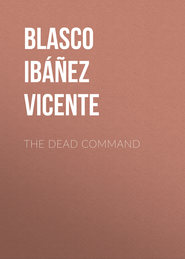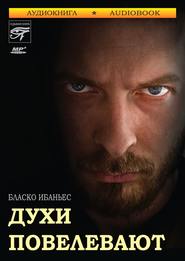По всем вопросам обращайтесь на: info@litportal.ru
(©) 2003-2024.
✖
The Four Horsemen of the Apocalypse
Настройки чтения
Размер шрифта
Высота строк
Поля
“About thirty thousand, sir.”
It was not necessary to hear more. The supercilious merchant sprang from his desk, and obsequiously offered him a seat.
“You can be no other than Don Madariaga.”
“At the service of God and yourself, sir,” he responded in the manner of a Spanish countryman.
That was the most glorious moment of his existence.
In the outer office of the Directors of the Bank, the clerks offered him a seat until the personage the other side of the door should deign to receive him. But scarcely was his name announced than that same director ran to admit him, and the employee was stupefied to hear the ranchman say, by way of greeting, “I have come to draw out three hundred thousand dollars. I have abundant pasturage, and I wish to buy a ranch or two in order to stock them.”
His arbitrary and contradictory character weighed upon the inhabitants of his lands with both cruel and good-natured tyranny. No vagabond ever passed by the ranch without being rudely assailed by its owner from the outset.
“Don’t tell me any of your hard-luck stories, friend,” he would yell as if he were going to beat him. “Under the shed is a skinned beast; cut and eat as much as you wish and so help yourself to continue your journey. . . . But no more of your yarns!”
And he would turn his back upon the tramp, after giving him a few dollars.
One day he became infuriated because a peon was nailing the wire fencing too deliberately on the posts. Everybody was robbing him! The following day he spoke of a large sum of money that he would have to pay for having endorsed the note of an acquaintance, completely bankrupt. “Poor fellow! His luck is worse than mine!”
Upon finding in the road the skeleton of a recently killed sheep, he was beside himself with indignation. It was not because of the loss of the meat. “Hunger knows no law, and God has made meat for mankind to eat. But they might at least have left the skin!” . . . And he would rage against such wickedness, always repeating, “Lack of religion and good habits!” The next time, the bandits stripped the flesh off of three cows, leaving the skins in full view, and the ranchman said, smiling, “That is the way I like people, honorable and doing no wrong.”
His vigor as a tireless centaur had helped him powerfully in his task of populating his lands. He was capricious, despotic and with the same paternal instincts as his compatriots who, centuries before when conquering the new world, had clarified its native blood. Like the Castilian conquistadors, he had a fancy for copper-colored beauty with oblique eyes and straight hair. When Desnoyers saw him going off on some sudden pretext, putting his horse at full gallop toward a neighboring ranch, he would say to himself, smilingly, “He is going in search of a new peon who will help work his land fifteen years from now.”
The personnel of the ranch often used to comment on the resemblance of certain youths laboring here the same as the others, galloping from the first streak of dawn over the fields, attending to the various duties of pasturing. The overseer, Celedonio, a half-breed thirty years old, generally detested for his hard and avaricious character, also bore a distant resemblance to the patron.
Almost every year, some woman from a great distance, dirty and bad-faced, presented herself at the ranch, leading by the hand a little mongrel with eyes like live coals. She would ask to speak with the proprietor alone, and upon being confronted with her, he usually recalled a trip made ten or twelve years before in order to buy a herd of cattle.
“You remember, Patron, that you passed the night on my ranch because the river had risen?”
The Patron did not remember anything about it. But a vague instinct warned him that the woman was probably telling the truth. “Well, what of it?”
“Patron, here he is. . . . It is better for him to grow to manhood by your side than in any other place.”
And she presented him with the little hybrid. One more, and offered with such simplicity! . . . “Lack of religion and good habits!” Then with sudden modesty, he doubted the woman’s veracity. Why must it necessarily be his? . . . But his wavering was generally short-lived.
“If it’s mine, put it with the others.”
The mother went away tranquilly, seeing the youngster’s future assured, because this man so lavish in violence was equally so in generosity. In time there would be a bit of land and a good flock of sheep for the urchin.
These adoptions at first aroused in Misia Petrona a little rebellion—the only ones of her life; but the centaur soon reduced her to terrified silence.
“And you dare to complain of me, you weak cow! . . . A woman who has only given me daughters. You ought to be ashamed of yourself.”
The same hand that negligently extracted from his pocket a wad of bills rolled into a ball, giving them away capriciously without knowing just how much, also wore a lash hanging from the wrist. It was supposed to be for his horse, but it was used with equal facility when any of his peons incurred his wrath.
“I strike because I can,” he would say to pacify himself.
One day, the man receiving the blow, took a step backward, hunting for the knife in his belt.
“You are not going to beat me, Patron. I was not born in these parts. . . . I come from Corrientes.”
The Patron remained with upraised thong. “Is it true that you were not born here? . . . Then you are right; I cannot beat you. Here are five dollars for you.”
When Desnoyers came on the place, Madariaga was beginning to lose count of those who were under his dominion in the old Latin sense, and could take his blows. There were so many that confusion often reigned.
The Frenchman admired the Patron’s expert eye for his business. It was enough for him to contemplate for a few moments a herd of cattle, to know its exact number. He would go galloping along with an indifferent air, around an immense group of horned and stamping beasts, and then would suddenly begin to separate the different animals. He had discovered that they were sick. With a buyer like Madariaga, all the tricks and sharp practice of the drovers came to naught.
His serenity before trouble was also admirable. A drought suddenly strewed his plains with dead cattle, making the land seem like an abandoned battlefield. Everywhere great black hulks. In the air, great spirals of crows coming from leagues away. At other times, it was the cold; an unexpected drop in the thermometer would cover the ground with dead bodies. Ten thousand animals, fifteen thousand, perhaps more, all perished!
“WHAT a knock-out!” Madariaga would exclaim with resignation. “Without such troubles, this earth would be a paradise. . . . Now, the thing to do is to save the skins!”
And he would rail against the false pride of the emigrants, against the new customs among the poor which prevented his securing enough hands to strip the victims quickly, so that thousands of hides had to be lost. Their bones whitened the earth like heaps of snow. The peoncitos (little peons) went around putting the skulls of cows with crumpled horns on the posts of the wire fences—a rustic decoration which suggested a procession of Grecian lyres.
“It is lucky that the land is left, anyway!” added the ranchman.
He loved to race around his immense fields when they were beginning to turn green in the late rains. He had been among the first to convert these virgin wastes into rich meadow-lands, supplementing the natural pasturage with alfalfa. Where one beast had found sustenance before, he now had three. “The table is set,” he would chuckle, “we must now go in search of the guests.” And he kept on buying, at ridiculous prices, herds dying of hunger in others’ uncultivated fields, constantly increasing his opulent lands and stock.
One morning Desnoyers saved his life. The old ranchman had raised his lash against a recently arrived peon who returned the attack, knife in hand. Madariaga was defending himself as best he could, convinced from one minute to another that he was going to receive the deadly knife-thrust—when Desnoyers arrived and, drawing his revolver, overcame and disarmed the adversary.
“Thanks, Frenchy,” said the ranchman, much touched. “You are an all-round man, and I am going to reward you. From this day I shall speak to you as I do to my family.”
Desnoyers did not know just what this familiar talk might amount to, for his employer was so peculiar. Certain personal favors, nevertheless, immediately began to improve his position. He was no longer allowed to eat in the administration building, the proprietor insisting imperiously that henceforth Desnoyers should sit at his own table, and thus he was admitted into the intimate life of the Madariaga family.
The wife was always silent when her husband was present. She was used to rising in the middle of the night in order to oversee the breakfasts of the peons, the distribution of biscuit, and the boiling of the great black kettles of coffee or shrub tea. She looked after the chattering and lazy maids who so easily managed to get lost in the nearby groves. In the kitchen, too, she made her authority felt like a regular house-mistress, but the minute that she heard her husband’s voice she shrank into a respectful and timorous silence. Upon sitting down at table, the China would look at him with devoted submission, her great, round eyes fixed on him, like an owl’s. Desnoyers felt that in this mute admiration was mingled great astonishment at the energy with which the ranchman, already over seventy, was continuing to bring new occupants to live on his demesne.
The two daughters, Luisa and Elena, accepted with enthusiasm the new arrival who came to enliven the monotonous conversations in the dining room, so often cut short by their father’s wrathful outbursts. Besides, he was from Paris. “Paris!” sighed Elena, the younger one, rolling her eyes. And Desnoyers was henceforth consulted in all matters of style every time they ordered any “confections” from the shops of Buenos Aires.
The interior of the house reflected the different tastes of the two generations. The girls had a parlor with a few handsome pieces of furniture placed against the cracked walls, and some showy lamps that were never lighted. The father, with his boorishness, often invaded this room so cherished and admired by the two sisters, making the carpets look shabby and faded under his muddy boot-tracks. Upon the gilt centre-table, he loved to lay his lash. Samples of maize scattered its grains over a silk sofa which the young ladies tried to keep very choice, as though they feared it might break.
Near the entrance to the dining room was a weighing machine, and Madariaga became furious when his daughters asked him to remove it to the offices. He was not going to trouble himself to go outside every time that he wanted to know the weight of a leather skin! . . . A piano came into the ranch, and Elena passed the hours practising exercises with desperate good will. “Heavens and earth! She might at least play the Jota or the Perican, or some other lively Spanish dance!” And the irate father, at the hour of siesta, betook himself to the nearby eucalyptus trees, to sleep upon his poncho.
This younger daughter whom he dubbed La Romantica, was the special victim of his wrath and ridicule. Where had she picked up so many tastes which he and his good China never had had? Music books were piled on the piano. In a corner of the absurd parlor were some wooden boxes that had held preserves, which the ranch carpenter had been made to press into service as a bookcase.
“Look here, Frenchy,” scoffed Madariaga. “All these are novels and poems! Pure lies! . . . Hot air!”
He had his private library, vastly more important and glorious, and occupying less space. In his desk, adorned with guns, thongs, and chaps studded with silver, was a little compartment containing deeds and various legal documents which the ranchman surveyed with great pride.
“Pay attention, now and hear marvellous things,” announced the master to Desnoyers, as he took out one of his memorandum books.
This volume contained the pedigree of the famous animals which had improved his breeds of stock, the genealogical trees, the patents of nobility of his aristocratic beasts. He would have to read its contents to him since he did not permit even his family to touch these records. And with his spectacles on the end of his nose, he would spell out the credentials of each animal celebrity. “Diamond III, grandson of Diamond I, owned by the King of England, son of Diamond II, winner in the races.” His Diamond had cost him many thousands, but the finest horses on the ranch, those which brought the most marvellous prices, were his descendants.
“That horse had more sense than most people. He only lacked the power to talk. He’s the one that’s stuffed, near the door of the parlor. The girls wanted him thrown out. . . . Just let them dare to touch him! I’d chuck them out first!”
Then he would continue reading the history of a dynasty of bulls with distinctive names and a succession of Roman numbers, the same as kings—animals acquired by the stubborn ranchman in the great cattle fairs of England. He had never been there, but he had used the cable in order to compete in pounds sterling with the British owners who wished to keep such valuable stock in their own country. Thanks to these blue-blooded sires that had crossed the ocean with all the luxury of millionaire passengers, he had been able to exhibit in the concourses of Buenos Aires animals which were veritable towers of meat, edible elephants with their sides as fit and sleek as a table.
“That book amounts to something! Don’t you think so, Frenchy? It is worth more than all those pictures of moons, lakes, lovers and other gewgaws that my Romantica puts on the walls to catch the dust.”
And he would point out, in contrast, the precious diplomas which were adorning his desk, the metal vases and other trophies won in the fairs by the descendants of his blooded stock.















